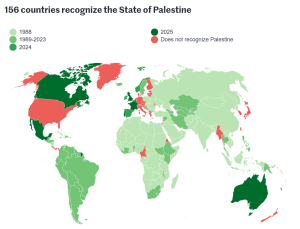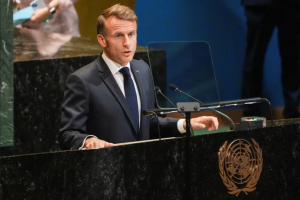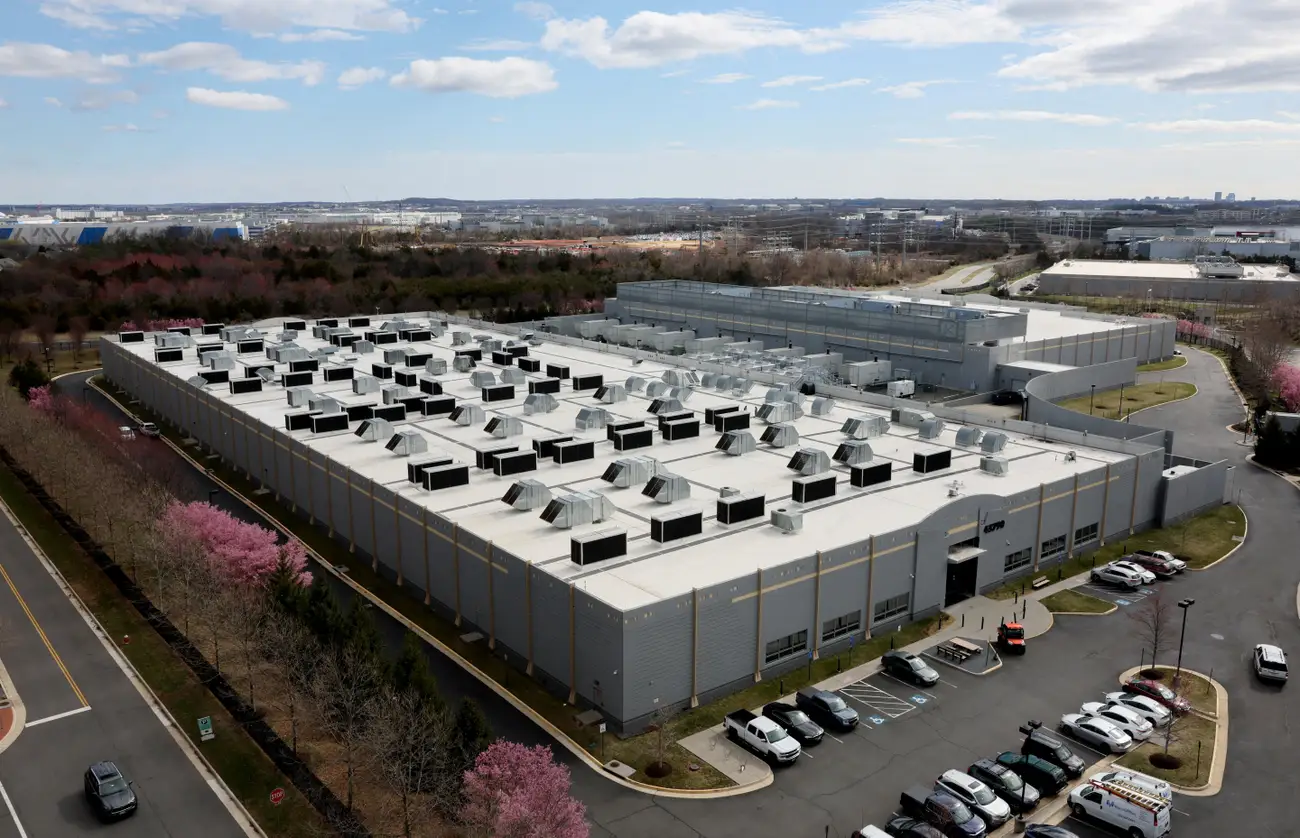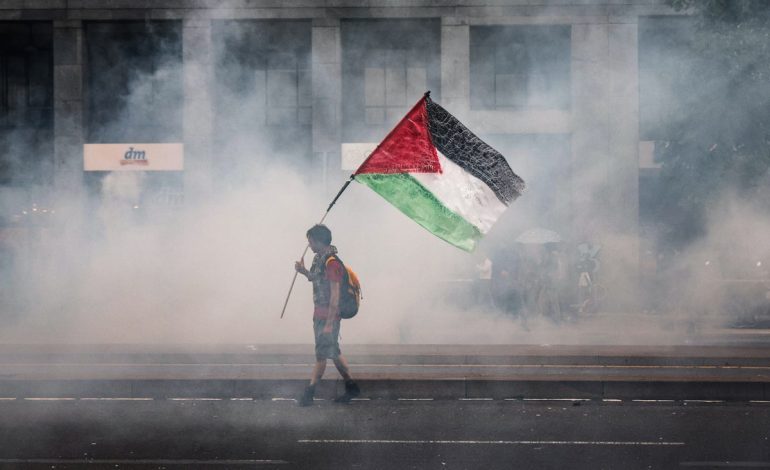For decades, the question of Palestinian statehood has lingered in global diplomacy, rising and falling with wars, peace talks, and shifting alliances. Today, as Gaza reels under relentless bombardment and the West Bank remains fragmented by Israeli settlements, recognition of Palestine by more countries is back in the headlines. But will this wave of recognition change anything — or is it just another symbolic act in a conflict where symbolism often substitutes for substance?
The recognition of Palestine didn’t start yesterday. In 1988, the Palestine Liberation Organization declared an independent Palestinian state, and over 70 countries — mostly in the Global South — quickly extended recognition. In 2012, the UN General Assembly upgraded Palestine’s status to “non-member observer state,” a move celebrated in Ramallah but one that fell short of full membership, blocked by US veto power at the Security Council. In 2024, Palestine was bumped up to “Permanent Observer State” at the UN—joining a club that, until now, only included the Vatican. But a bigger leap hit a wall in April, when the United States vetoed a Security Council bid to grant Palestine full membership, stalling the upgrade despite wide international support.

Since then, recognition has functioned less as a path to sovereignty and more as a diplomatic signal — a way for countries to express solidarity with Palestinians or frustration with Israel, especially during wars in Gaza.
According to Le Monde, 146 of 193 UN member states currently recognize Palestine. Latin America, Africa, and much of Asia have long been on board. But the recent shift is happening in Europe. Spain, Ireland, Slovenia, and Norway have pushed recognition in their parliaments, and the European Parliament itself passed a resolution urging EU member states to follow suit. France has also signaled support, though cautiously, calling for recognition through the UN.
Israel and the United States, however, have worked tirelessly to block or undermine these moves. Recognition, they argue, rewards terrorism and undermines negotiations. Washington has threatened diplomatic and economic retaliation against allies who recognize Palestine.
As Stephen Zunes, Professor of Politics and International Studies at the University of San Francisco, points out:
“The Trump administration and the Republican Party oppose Palestinian statehood. The Democratic Party’s position is that the US should only recognize a Palestinian state under conditions agreed to by Israel through bilateral negotiations. Given that both the Israeli government and the leading opposition have categorically ruled out Palestinian statehood and that the Democrats, like the Republicans, categorically rule out pressuring Israel to compromise, they essentially oppose Palestinian statehood as well. Trump has threatened various forms of retaliation against US allies that have recognized Palestine, falsely accusing them of rewarding terrorism. However, Fatah and others in the current Palestinian government have not engaged in any terrorism for decades, and Hamas has not been part of the Palestinian government since 2007. Indeed, Hamas is banned in areas under Palestinian government control. It’s a rebel faction that seized Gaza by force eighteen years ago and which has taken up arms against the Fatah-led government.”
Recognition carries symbolic weight, but does it alter realities for Palestinians? Not really.
Jim Krane, Wallace S. Wilson Fellow for Energy Studies at Rice University’s Baker Institute, argues:
“It’s an important symbolic move that signals governments’ increasing frustration with the conduct of the Israeli war on Gaza. But it has little practical impact. My guess is that these governments are under pressure from their populations to “do something” about the carnage in Gaza. But going up against the wishes of Washington and Israel is risky because it invites retaliation. So a symbolic gesture is all they can muster for the time being.”
Gregory Aftandilian, Senior Professorial Lecturer at the School of International Service at American University and adjunct faculty member at Boston University, agrees that recognition won’t shift ground realities:

French President Emmanuel Macron addresses delegates during a UN General Assembly summit meeting on a two-state solution between Israel and the Palestinians on Sept. 22, 2025
(Eduardo Munoz/Reuters)
“On a practical matter, recognition of a Palestinian state is not going to change things on the ground, especially as long as the Netanyahu government remains in charge because this government is adamantly opposed to such a state. However, symbolically it is important because it shows how isolated Israel is right now in the international community and how most countries in the world still believe that the two-state solution to the Israeli-Palestinian conflict is what everyone should strive for.”
And Mehran Kamrava, Professor of Government at Georgetown University Qatar and Director of the Iranian Studies Unit at the Arab Center for Research and Policy Studies, cuts even deeper:
“Insofar as life for Palestinians is concerned, there is little tangible change that European recognition means. There was a brief window in the 1990s when recognizing a Palestinian state would have meant something in terms of trade and commerce, travel and employment opportunities, and general economic and political conditions. For a number of years now, however, in practical terms a Palestinian state has been rendered untenable. The geographic dismemberment of the West Bank has picked up pace as strategically placed Israeli settlements now encircle the territory and make connections between Palestinian cities extremely difficult. And, since late 2023, Gaza has been rendered literally uninhabitable. At this stage, recognition of a Palestinian state is a merely symbolic act and cannot accomplish much.”
Dr. Kamrava delved deeper into this issue in his 2016 book called The Impossibility of Palestine.

While diplomats talk recognition, Gaza burns. The latest humanitarian “Sumud Flotilla” — a coalition of boats carrying aid — has tried to break Israel’s naval blockade. Reports from Reuters and Al Jazeera describe how Israeli naval forces shadowed the ships with unlit vessels at night, preparing a likely interception.
The flotilla organizers insist their mission is legal under international maritime law, framing Israel’s blockade as collective punishment — a violation of humanitarian law. But the confrontation highlights the gap between symbolic recognition and the daily reality of Palestinians trapped in Gaza: recognition doesn’t feed hungry families or guarantee safe passage for aid.
The United States remains the biggest roadblock to meaningful recognition. President Trump has rolled out what he calls a “20-Step Plan for Gaza,” pitched as a comprehensive roadmap but widely criticized as favoring Israeli priorities. Netanyahu reportedly secured edits that slow Israel’s withdrawal from Gaza while tying Palestinian governance to strict US oversight.
The plan includes:
- Conditional governance for Gaza, where US-approved administrators oversee reconstruction.
- Security guarantees for Israel that allow indefinite “counterterror” operations.
- Strict limits on Palestinian sovereignty — no army, restricted borders, and heavy surveillance.
- Economic incentives packaged as “peace through prosperity.”
Critics, including Arab analysts and European diplomats, see it as less a peace plan and more a mechanism to cement Israeli control and delay any meaningful Palestinian sovereignty.
Recognition of Palestine is spreading, especially in Europe. But as Dr. Zunes notes, the bigger question is whether a two-state solution is even viable anymore:
“The decision by additional Western countries to recognize Palestine may actually be more of a reaction to the increasing colonization and repression in the Israeli-occupied West Bank, which are explicitly designed to prevent a viable contiguous Palestinian state alongside Israel from emerging, than about Israel’s war on Gaza. Though the United States could put an end to this by no longer blocking the enforcement of UN Security Council resolutions demanding a halt to the colonization of the occupied West Bank by illegal Israeli settlements, both Republican and Democratic administrations have refused to do so… The settlements in occupied East Jerusalem and the West Bank are so large and have now surrounded the Palestinian population centers administered by the Palestinian government that a viable contiguous Palestinian state may no longer be possible. A growing number of analysts see the recognition decision as too little too late and believe that a single binational state between the Jordan River and the Mediterranean Sea with equal rights for both peoples may actually be a more realistic option.”

Recognition, then, may be more about diplomacy and symbolism than sovereignty. It signals Israel’s growing isolation and Western governments’ frustration, but it doesn’t dismantle checkpoints, unblock Gaza’s ports, or roll back settlements.
For Palestinians under siege, the contrast is stark: European resolutions and UN votes make headlines, while aid flotillas risk interception on the open seas. Recognition may shape narratives, but unless Washington changes its approach — or Israel shifts its stance — it remains mostly symbolic.
And in a conflict where symbolism is abundant but justice scarce, symbolism alone is not enough.
Correction: Information about Palestine’s status in the US was added.










The latest news in your social feeds
Subscribe to our social media platforms to stay tuned